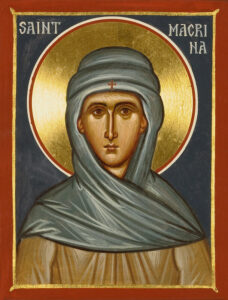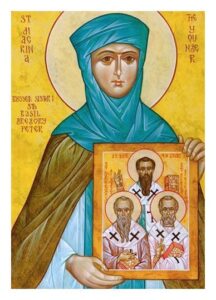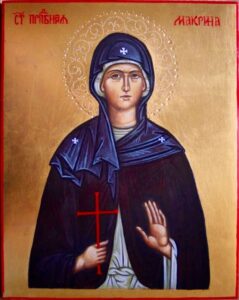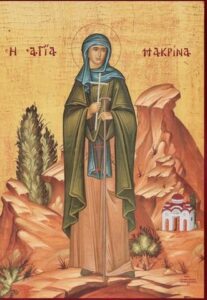St. Makrina, the Younger – July 19 I (A.D. 327 – 379)

Makrina was born in A.D. 327, Caesarea, Cappadocia, in a renowned holy family. Her father, Basil the elder, was a well-known lawyer and orator in Pontus. Her mother, Emelia, was the daughter of a martyr, during the time of persecution of Maximian. Her grandmother was Makrina the Elder. Basil and Emelia had five sons and five daughters. Makrina was the eldest among the ten children. St. Macrina ruled the roost in a family of saints, with charm and grace. Three of her brothers were Bishops; Mar Baselius of Caesarea (A.D. 329 – 397), Mar Gregorius of Nyssa (A.D. 335 – 394) {Cappadocian Fathers} and Mar Peter of Sebaste. One brother died in childhood and the second brother died when he was twenty-seven years old. Her sisters got married and entered family life. Makrina alone became a nun. One sister or sister-in-law is identified and is thought to have played an important role in the Church in Nyssa, where she was called diakonissa, the deaconess or wife of a deacon.

Macrina, a beautiful young woman, was called Thekla (Thecla) at home. Her mother, Emilia, saw an angel in a dream, naming her unborn child Thekla, in honor of the first century, female, holy Protomartyr Thekla. The family was very affluent and as their vast property spread over different provinces, they had to pay taxes to three Governors. Makrina was an expert in weaving woollen clothes. When she was only twelve years old, she was betrothed to a young boy who was related to her. The boy died and her father tried to persuade her to get married to another. Many young men sought marriage with her, because of her beauty, wisdom, and illustrious birth, and in tender youth but Macrina refused them all, having chosen the life of a virginity and devoted in asceticism, and prayer and not wanting to be unfaithful to the memory of her dead fiancé. But she disagreed. Her argument was just as there was only one birth and one death, there was only one marriage too. The man who was bonded to the bride in marriage was not dead but kept apart. she chose to remain single to devote herself to Christian service.
Her father died in A.D. 349 and Makrina continued living with her mother. She spoke thus of Makrina, “I carried my children in my womb for a definite period, but Makrina has been carrying me always.” Emelia had given her daughter a Christian version of a classic education, training her in Scripture instead of Greek literature. Emilia herself guided the upbringing and education of her daughter Macrina. She taught her reading and writing in the Scriptural books and Psalms of David, selecting examples from the sacred books which spoke of a pious and God-pleasing life. Saint Emilia taught her daughter to pray and to attend Church services. Macrina was also taught the proper knowledge of domestic governance and various handicrafts. She was never left idle and did not participate in childish games or amusements.
In turn, Macrina conducted the early education of her younger brothers and sisters and formed them in piety. Makrina’s brother Basil, returned from Athens after his higher education in A.D. 355, after a brilliant career in the best schools of Constantinople and Athens, puffed up with not a little youthful pride-for knowledge, it was the ardent admonitions and holy example of his blessed sister Makrina, that persuaded him to turn from seeking worldly glory to the service of God. In the meantime, Makrina had led her mother to a new phase of life, freed their slaves and treated them on an equal basis. As the eldest child, Macrina exercised a formative influence on her more famous brothers and even on her mother.

Her second brother, Naucratius was a person of exceptional talents. He chose a life of solitude and poverty. He started living a life of solitude on the banks of River Iris flowing through Pontus. He also took care of some old people who lived in abject poverty. He considered the period of his youth as a travel towards the divine destination and lived obeying his mother’s commands. He had an untimely and sudden death in A.D. 357. Makrina was a source of courage to her mother, stood by her and consoled her in the adverse times. Her words offered relief and enabled her mother to live by counting her blessings and God given happy moments instead of lamenting over the loss. Both mother and daughter spent their days in doing acts of benevolence. Her youngest brother Peter was influenced by her profusely. Emelia died in A.D. 373 in the presence of Makrina and Peter. She was entombed in the Church of the Forty Martyrs.
In A.D. 370 Basil was consecrated the Bishop of Caesarea. He ordained his brother Peter a priest in A.D. 371. Mar Baselius passed away eight years later in A.D. 379. It came as a crushing blow for Makrina. Mar Gregory of Nyssa, another brother of Macrina visited her in A.D. 380, after attending a Synod at Antioch. She had high fever and was almost at death’s door, but she was lying on the floor on a wooden board covered with sackcloth. Though exhausted she raised herself on her elbows to show her respect to her brother. She prayed ‘Oh, God, you have granted me this favour by sending your servant to visit your handmaid’. On hearing about the death of their brother Mar Basil, Mar Gregory burst out crying. Seeing the grief of her brother she scolded him, “You should not mourn for those who departed to Christ like one without hope.” Her words disclosed the enigmatic divine purpose concealed in disasters. Mar Gregory retired to rest after a lengthy conversation with his sister.
When Mar Gregory visited her again, she recalled events of their childhood, parents etc. Their paternal grandparents were Christians and hence their wealth was confiscated for confessing in Christ. Gregory talked about his exile by Emperor Valens on account of faith, disputes in the Church and persecution. Macrina asked him “Are you unaware of the divine blessing? Will you atone for the ingratitude of your soul? Have you compared your position with that of your parents? Your father was greatly esteemed throughout Pontus. But you are renowned everywhere, even beyond Pontus. Don’t you see the benevolence of God in all this? Do you recognise the contribution of your parents’ prayers?”
Macrina fell ill. Gregory came to visit her and found her in a very weakened condition, lying on two planks. Even though Macrina could barely talk, she spoke eloquently with her brother about death and the future life. Then she prayed: “I have fought a good battle, completed my race and protected faith.” St. Makrina, on her death bed asked her brother, St. Gregory of Nyssa to bury her facing East. Then she closed her eyes as in natural sleep, but she soon slipped off to eternal sleep. The nuns wept over their loss. They said: “The light of our eyes is extinguished. The soul that guided us has departed from us.” Mar Gregory tried to console them “Remember her commands and training. She taught us to weep only at the time of prayer . . . Let us turn our lamentation into singing Psalms in the same strain.”
Vestiana, a widow and an inmate of the nunnery dressed holy Macrina in white attire and made preparations for her funeral. Lampadia, a nun, declared she knew Makrina’s wishes in the matter of her burial. She never cared for any special preparation. She had neither procured nor stored any clothes for the purpose. Mar Gregory enquired whether they had any proper attire for a fitting funeral. Lampadia replied other than the dress she was wearing and a pair of old slippers there were only a cloak and a head covering. There was nothing stored away in the bedroom or anywhere else. Macrina had only one storehouse for her wealth. That was in heaven. There she had stored all; nothing was left on earth.
The funeral preparations being over, an all-night vigil was kept. A stream of visitors arrived. The funeral procession started the next morning with the ladies and nuns on one side, the monks, and men on the other side reciting Psalms. Bishop Araxius of Ibora came along with a group of priests to attend her funeral. She was entombed in the tomb of her parents near the Church of Forty Martyrs. Saint Macrina was granted the gift of wonderworking. Through the prayers of the saint, there was no shortage of wheat at her monastery in times of famine.
Macrina lived a chaste and humble life, devoting her time to prayer and the spiritual education of her younger brother, Peter. Gregory presents her choosing the devoted study of Scripture and other A blind daughter of a soldier gained sight through the intercession prayers of Macrina even during her lifetime. Many, sick was healed, and evil spirits exorcised after praying to her. St. Gregory of Nyssa, her biographer, expanded his sister’s deathbed reflections on the future life in his book, ‘On the Soul and the Resurrection’ and ‘Life of St Macrina’ in which he describes her sanctity and asceticism throughout her life. Saint Macrina founded a convent, Her feast is celebrated on 19 July by the Orthodox Syrian Church.

Since the light of righteousness shone brightly in thee, thou was an example of the life of piety for all, teaching the virtues to them that cry: Rejoice, Macrina, thou boast of virginity.
Merciful God, who called your servant Macrina to reveal in her life and her teaching the riches of your grace and truth: Mercifully grant that we, following her example, may seek after your wisdom and live according to her way; through Jesus Christ our Savior, who lives and reigns with you and the Holy Spirit, one God, for ever and ever.

0 Comments